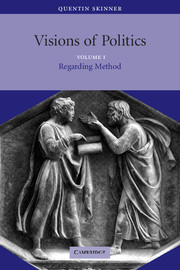Book contents
- Frontmatter
- Contents
- General preface
- Full Contents: Volumes 1–3
- Acknowledgements
- Conventions
- 1 Introduction : Seeing things their way
- 2 The practice of history and the cult of the fact
- 3 Interpretation, rationality and truth
- 4 Meaning and understanding in the history of ideas
- 5 Motives, intentions and interpretation
- 6 Interpretation and the understanding of speech acts
- 7 ‘Social meaning’ and the explanation of social action
- 8 Moral principles and social change
- 9 The idea of a cultural lexicon
- 10 Retrospect : Studying rhetoric and conceptual change
- Bibliography
- Index
1 - Introduction : Seeing things their way
Published online by Cambridge University Press: 05 September 2012
- Frontmatter
- Contents
- General preface
- Full Contents: Volumes 1–3
- Acknowledgements
- Conventions
- 1 Introduction : Seeing things their way
- 2 The practice of history and the cult of the fact
- 3 Interpretation, rationality and truth
- 4 Meaning and understanding in the history of ideas
- 5 Motives, intentions and interpretation
- 6 Interpretation and the understanding of speech acts
- 7 ‘Social meaning’ and the explanation of social action
- 8 Moral principles and social change
- 9 The idea of a cultural lexicon
- 10 Retrospect : Studying rhetoric and conceptual change
- Bibliography
- Index
Summary
‘Facts alone are wanted in life’, Mr Gradgrind assures us at the start of Hard Times. Many historians appear to share Mr Gradgrind's sentiment, but some of the most powerful voices in recent philosophy have questioned whether there are any indisputable facts to be acquired. I am concerned in the chapters that follow with three principal aspects of this sceptical challenge. I shall mainly be writing as a practising historian reflecting on the task in hand. But I shall nevertheless have the temerity to suggest that there are good reasons in each instance for joining the sceptical camp.
One assault on the world of facts was launched some time ago from the direction of the theory of knowledge. This campaign was primarily waged by those who aimed to discredit the empiricist belief that our world consists of sense data capable of being directly perceived and uncontentiously described. It would not be too much to say that by now this particular dogma of empiricism has fallen into very general disrepute. Scarcely anyone nowadays believes in the possibility of building up structures of factual knowledge on foundations purporting to be wholly independent of our judgements.
I seek in chapters 2 and 3 to explore some implications of this post-empiricist critique, implications that seem to me of special relevance for practising historians.
- Type
- Chapter
- Information
- Visions of Politics , pp. 1 - 7Publisher: Cambridge University PressPrint publication year: 2002
- 1
- Cited by



